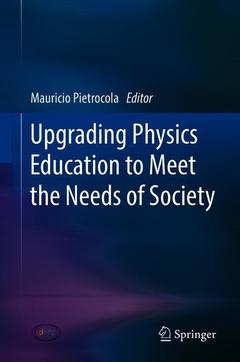Description
Upgrading Physics Education to Meet the Needs of Society, 1st ed. 2019
Coordinator: Pietrocola Maurício
Language: English
Subjects for Upgrading Physics Education to Meet the Needs of Society:
Keywords
Learning and Physics Teaching; Technology in teaching physics; Mathematical model of peer instruction in physics teaching; Innovation in physics education; Human rights and physics education; Physics Education; Physics Teachers; Race; Gender; and Sexual Minorities in Physics; learning and instruction
252 p. · 15.5x23.5 cm · Hardback
Description
/li>Contents
/li>Biography
/li>Comment
/li>
Dialogic Development of Children's Ideas using Computation in the Classroom: keeping it simple, Ian Lawrence.- Technology in Teaching Physics: Benefits, Challenges, and solutions, Ton Ellermeijer, Trinh-Ba Tran.- Sharing LHC Research and Discovery with High School Students, Marcia Begalli, Uta Bilow.- A Mathematical Model of Peer Instruction and its Applications, Hideo Nitta.- Research-based Alternatives to Traditional Physics Teaching at University and College, Jenaro Guisasola.- Organizing Teaching to Solve Problems: the Case of Latitude and Longitude in Pre-Service Primary Teachers’ Education, Limiñana, R., Menargues, A., Rosa, S..- A Reflection on Research-Based Alternatives of Physics Teaching on Educational Activity System, Cristiano Mattos.- The Design of Activities based on Cognitive Scaffolding to Teach Physics, Genaro Zavala.- Examining the Relationships Among North Dakota State University.- Innovation in Physics Teaching/learning for the Formative Success in IntroductoryPhysics for bio-area Degrees: the Case of Fluids, Marisa Michelini, Alberto Stefanel.- Conceptual Development and Critical Attitude in Physics Education: A Pathway in the Search for Coherence, Laurence Viennot.- Indigenous and Afro Knowledge in Science Education: Dialogues and Conflicts, Antonia Candela & Johanna Rey.- Race, Gender, and Sexual Minorities in Physics: Hashtag Activism in Brazil, Katemari Rosa.- Diversity, Human Rights and Physics Education – Theoretical Perspectives and Critical Awareness, Tanja Tajmel.




